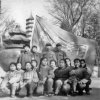- 注册
- 2004-07-18
- 消息
- 46,697
- 荣誉分数
- 20,497
- 声望点数
- 1,393
傅苹今天在其博客上针对我的批评,贴了一篇澄清声明:
http://www.huffingtonpost.com/ping-fu/clarifying-the-facts-in-bend-not-break_b_2603405.html
傅苹声称,虽然我的批评是正确的,但是是根据福布斯不准确的报道,而不是根据她新出的书,福布斯的报道后来更正了(意思是我的批评成了无的放矢)。
事实上,看过我对她的批评文章的就知道,虽然福布斯的报道引发了我的批评,但是我的批评并非仅仅针对福布斯的报道,而是针对自2005年以来美国媒体对傅苹的各种报道、傅苹的电台和视频访谈。我也看了傅苹新书放在google book上供试读的前面两章。它们的内容都相当的一致。如果说福布斯的报道有错的话,那么此前美国媒体的其他报道、傅苹接受电台和视频访谈亲口说的话,也全都错了。怪罪到福布斯上面是无济于事的。
傅苹声称,“我没有说过或写过我是在劳改营;我说的是我在南航校园的一个大学宿舍里生活了10年。中国儿童不被送去劳改营。我也没有说我是一个工厂工人。我说毛要我们向农民、战士和工人学习。”(我的翻译)
就在10天前,傅苹接受谷歌的视频访谈时,还说整个文革十年她都生活在隔离区(ghetto)([ame="http://www.youtube.com/watch?v=s4vRtvswO8s"]Ping Fu: "Bend not Break", Authors at Google - YouTube[/ame] 大约7分15秒开始)。NPR采访她时,说她十岁时被送到劳改农场(correctional farm)达10年之久,她有声有色地讲述如何从劳改农场带东西回来喂她妹妹的故事( http://thestory.org/archive/the_story_988_Ping_Fu.mp3 15:50开始)。她好意思怪美国记者理解错了她的意思?
在此前她接受美国英文媒体的所有采访中,她从来说的是从9岁起她被迫在工厂工作,整个文革期间没有受过教育,何时说过她在工厂的工作指的是“毛要我们向农民、战士和工人学习”?(只在中文媒体上这么说过)那不就是当时每个中国学生都经历过的学工、学农、学军吗?那不就是正常教育的一部分吗?怎么就成了她个人的苦难了?是不是所有经历过文革的中国学生都可以向她学习,声称自己在十年间都在工厂工作,没有受过学校教育?
傅苹声称,自1972年开始学校复课,她从此不知疲倦地学习。
文革期间的学校复课是从1968年就开始的。我们姑且相信南京学校比较特殊,迟至1972年才复课吧。但是此前美国媒体的报道全说她整整10年没有上过学,例如《公司》的报道(http://www.inc.com/magazine/20051201/ping-fu.html ),WeNews的报道(http://womensenews.org/story/women-...rises-in-tech-firmament?page=0,1#.UQzHxqVkw1I ),NPR甚至说她十年间没进过教室(http://www.npr.org/2006/03/18/5279787/ping-fu-recreating-the-world-in-all-its-dimensions )。《伊利诺校友杂志》则说她被关了10年,18岁时才被释放。(http://www.uiaa.org/illinois/news/illinoisalumni/0707_b.html )
为什么所有这些采访过她的美国媒体全都搞错了?都认为她和其他中国学生不一样,没受过任何正常教育?
傅苹声称,到现在她还记得她目睹了教师被红卫兵四马分尸。但是在看了我的分析后,她承认我的分析比她的记忆靠谱。她说中国对这种虐杀有一种说法,而她为此做了很多噩梦。
这意思是她承认把噩梦当成了现实。中国的说法是“五马分尸”,而不是四马分尸。四马分尸是西方的酷刑。她小时候要做噩梦也应该梦的是五马分尸,而不是四马分尸。更可能的是,她根据西方人的口味来编造四马分尸的故事。
傅苹承认她关于一胎化政策导致溺婴的论文从未发表过,也从未被《人民日报》报道过。但是她说她记得在1982年读过《人民日报》一篇呼吁男女平等的社论。
此前她在接受美国媒体采访时不是一直在说她的论文一度引起了轰动,《文汇报》《人民日报》都不点名地报道了其研究结果了吗?甚至连邓小平都对她的论文感兴趣吗?(听她亲口在NPR说:http://thestory.org/archive/the_story_988_Ping_Fu.mp3 18:00)既然她的论文从未发表过,报纸怎么知道她的研究成果?就算报纸有秘密通道知道其研究,所谓的报道居然就是一篇呼吁男女平等的社论?当时中国报纸呼吁男女平等那是一点都不奇怪的,她有什么理由相信那和她的论文有关?在其声明中她甚至不敢明确地说《人民日报》的社论与她的论文有关。
傅苹声称,所谓联合国因为其论文而制裁中国的说法是她在等护照时听人说的。
原来这么重大而离奇的事件,最多只是她的道听途说,然后就在美国媒体上到处宣讲?
傅苹提到美国斯坦福大学学生Steven W. Mosher在1981年发表中国溺婴的研究,在1984年出版了有关著作,并称那一年她正在等护照。她并提到《洛杉矶时报》曾报道说Mosher成功游说小布什政府不向联合国提供用于中国的资金。她认为这与她在国内的经历一致。
1984年1月傅苹已经到美国了,为了跟Mosher扯上关系,怎么又改口说成那一年她还在等护照?小布什政府因为反对中国的人口政策而不向联合国人口基金会提供资金,那是小布什政府制裁联合国,和联合国制裁中国有什么关系?而且小布什是2001年上台的,那时候傅苹已在美国生活17年了,和她所谓被迫离开中国,又怎么能扯上关系?
Mosher在1980年左右曾在中国做人口学研究,他关于中国强迫人工流产的文章1981年在台湾发表后,惹怒了中国政府,斯坦福大学于1983年以其违背研究伦理、从事非法活动为由将他开除。他起诉斯坦福大学。这个案件在1984年——也就是傅苹到美国那一年——非常有名,但现在已很少有人知道了。傅苹突然提起她刚到美国时很著名而现在已鲜为人知的这个案子,让我不得不怀疑她当年正是根据Mosher的案子来捏造她的论文故事,以此申请政治避难的。
傅苹声称,因为其论文政府要求她离开中国,但政府没有给特定期限。她通过在新墨西哥大学的一个家庭朋友获得了学生签证。
在此前她接受采访时,全都说是她被中国政府要求在两周内离开中国。直到前天她还在对福布斯记者这么说。最离谱的是她10天前接受谷歌的采访,这是她亲口说的:她的论文引起了国际轰动,联合国对中国进行制裁,她被投入监狱关了三天,因为邓小平问写论文的那个人现在怎么样了,她才被放出来,两周后警方交给她护照要她离开中国。([ame="http://www.youtube.com/watch?v=s4vRtvswO8s"]Ping Fu: "Bend not Break", Authors at Google - YouTube[/ame] 从10:30开始)她的案子连邓小平都被惊动了,她两周就得到护照了——没错,这是她十天前对着镜头亲口说的。仅仅过了十天,她就改口说因为办护照极其困难,她被释放后等了一年多才拿到护照。这不是撒谎、骗人,是什么?
傅苹声称,在她上大学时英语是选修课,不是必修课,她从未学过英语,她的英语水平是零,在抵达美国时只记得几个英语单词。
不再说只懂三个英语单词了?但是这仍是谎言。第一、从恢复高考开始,英语就是大学的必修课,她不可能没上过英语课。第二、她的大学同班同学滋兰斋主人(傅苹承认是她的大学同班同学)在批评傅苹的文章中说:“当年我们中文系1978级两个班,这个人的英语水平算是高的,在快班。”第三、傅苹承认自己考上了南京大学比较文学硕士专业的研究生,只是因故没有去上。研究生入学考试必考英语。
顺便说一下,傅苹声称其大学同班同学滋兰斋主人的文章是对我的回应,和她的说法一致,这也是谎言,是欺骗不懂中文的美国读者。事实上,滋兰斋主人的文章是在揭露她的谎言的:http://zilanzai.i.sohu.com/blog/view/253678027.htm
傅苹声称,在那张红卫兵合影照片中,如果放大的画可以看出她没有戴红卫兵袖章,那是他们在她读书的学校的红卫兵旗帜前照的。
实际上,在那张照片中,每个人的左手臂都戴着红卫兵袖章,包括傅苹。那张照片并非是在学校照的,而是在南京灵谷寺照的,是他们打着“红卫兵团”旗帜去那里游玩时的合影。
傅苹声称,她没有申请政治避难。
但是《星岛日报》去年2月份关于她参加美国国土安全部移民局举办的首届移民企业家峰会,并获得美国移民局授予“杰出归化美国人”称号的报道明确说她是通过政治避难获得绿卡的:“坐在主讲台上的四位移民企业家都有各自的故事,杰魔公司华裔董事长傅苹出生在中国大陆,成长于文革时期,1983年来美国后申请了难民庇护得到身分,之后创立了自己的公司。”(http://oversea.stnn.cc/NY/201202/t20120224_1707578.html )如果傅苹不是通过政治避难获得美国绿卡,她又是通过什么途径在1987年之前获得绿卡的?其他途径都更不适合她。
傅苹声称批评不是诽谤,而是讲述或寻找真相的方式,她欢迎建设性的批评。
她一直在说假话,讲了很多年,现在发现谎言圆不了了,就用新的谎言掩盖,这如何建设得起来?揭露一个说谎的人说谎,揭露一个骗人的人骗人,那不叫诽谤,那只是指出事实真相。
2013.2.2.
http://www.huffingtonpost.com/ping-fu/clarifying-the-facts-in-bend-not-break_b_2603405.html
傅苹声称,虽然我的批评是正确的,但是是根据福布斯不准确的报道,而不是根据她新出的书,福布斯的报道后来更正了(意思是我的批评成了无的放矢)。
事实上,看过我对她的批评文章的就知道,虽然福布斯的报道引发了我的批评,但是我的批评并非仅仅针对福布斯的报道,而是针对自2005年以来美国媒体对傅苹的各种报道、傅苹的电台和视频访谈。我也看了傅苹新书放在google book上供试读的前面两章。它们的内容都相当的一致。如果说福布斯的报道有错的话,那么此前美国媒体的其他报道、傅苹接受电台和视频访谈亲口说的话,也全都错了。怪罪到福布斯上面是无济于事的。
傅苹声称,“我没有说过或写过我是在劳改营;我说的是我在南航校园的一个大学宿舍里生活了10年。中国儿童不被送去劳改营。我也没有说我是一个工厂工人。我说毛要我们向农民、战士和工人学习。”(我的翻译)
就在10天前,傅苹接受谷歌的视频访谈时,还说整个文革十年她都生活在隔离区(ghetto)([ame="http://www.youtube.com/watch?v=s4vRtvswO8s"]Ping Fu: "Bend not Break", Authors at Google - YouTube[/ame] 大约7分15秒开始)。NPR采访她时,说她十岁时被送到劳改农场(correctional farm)达10年之久,她有声有色地讲述如何从劳改农场带东西回来喂她妹妹的故事( http://thestory.org/archive/the_story_988_Ping_Fu.mp3 15:50开始)。她好意思怪美国记者理解错了她的意思?
在此前她接受美国英文媒体的所有采访中,她从来说的是从9岁起她被迫在工厂工作,整个文革期间没有受过教育,何时说过她在工厂的工作指的是“毛要我们向农民、战士和工人学习”?(只在中文媒体上这么说过)那不就是当时每个中国学生都经历过的学工、学农、学军吗?那不就是正常教育的一部分吗?怎么就成了她个人的苦难了?是不是所有经历过文革的中国学生都可以向她学习,声称自己在十年间都在工厂工作,没有受过学校教育?
傅苹声称,自1972年开始学校复课,她从此不知疲倦地学习。
文革期间的学校复课是从1968年就开始的。我们姑且相信南京学校比较特殊,迟至1972年才复课吧。但是此前美国媒体的报道全说她整整10年没有上过学,例如《公司》的报道(http://www.inc.com/magazine/20051201/ping-fu.html ),WeNews的报道(http://womensenews.org/story/women-...rises-in-tech-firmament?page=0,1#.UQzHxqVkw1I ),NPR甚至说她十年间没进过教室(http://www.npr.org/2006/03/18/5279787/ping-fu-recreating-the-world-in-all-its-dimensions )。《伊利诺校友杂志》则说她被关了10年,18岁时才被释放。(http://www.uiaa.org/illinois/news/illinoisalumni/0707_b.html )
为什么所有这些采访过她的美国媒体全都搞错了?都认为她和其他中国学生不一样,没受过任何正常教育?
傅苹声称,到现在她还记得她目睹了教师被红卫兵四马分尸。但是在看了我的分析后,她承认我的分析比她的记忆靠谱。她说中国对这种虐杀有一种说法,而她为此做了很多噩梦。
这意思是她承认把噩梦当成了现实。中国的说法是“五马分尸”,而不是四马分尸。四马分尸是西方的酷刑。她小时候要做噩梦也应该梦的是五马分尸,而不是四马分尸。更可能的是,她根据西方人的口味来编造四马分尸的故事。
傅苹承认她关于一胎化政策导致溺婴的论文从未发表过,也从未被《人民日报》报道过。但是她说她记得在1982年读过《人民日报》一篇呼吁男女平等的社论。
此前她在接受美国媒体采访时不是一直在说她的论文一度引起了轰动,《文汇报》《人民日报》都不点名地报道了其研究结果了吗?甚至连邓小平都对她的论文感兴趣吗?(听她亲口在NPR说:http://thestory.org/archive/the_story_988_Ping_Fu.mp3 18:00)既然她的论文从未发表过,报纸怎么知道她的研究成果?就算报纸有秘密通道知道其研究,所谓的报道居然就是一篇呼吁男女平等的社论?当时中国报纸呼吁男女平等那是一点都不奇怪的,她有什么理由相信那和她的论文有关?在其声明中她甚至不敢明确地说《人民日报》的社论与她的论文有关。
傅苹声称,所谓联合国因为其论文而制裁中国的说法是她在等护照时听人说的。
原来这么重大而离奇的事件,最多只是她的道听途说,然后就在美国媒体上到处宣讲?
傅苹提到美国斯坦福大学学生Steven W. Mosher在1981年发表中国溺婴的研究,在1984年出版了有关著作,并称那一年她正在等护照。她并提到《洛杉矶时报》曾报道说Mosher成功游说小布什政府不向联合国提供用于中国的资金。她认为这与她在国内的经历一致。
1984年1月傅苹已经到美国了,为了跟Mosher扯上关系,怎么又改口说成那一年她还在等护照?小布什政府因为反对中国的人口政策而不向联合国人口基金会提供资金,那是小布什政府制裁联合国,和联合国制裁中国有什么关系?而且小布什是2001年上台的,那时候傅苹已在美国生活17年了,和她所谓被迫离开中国,又怎么能扯上关系?
Mosher在1980年左右曾在中国做人口学研究,他关于中国强迫人工流产的文章1981年在台湾发表后,惹怒了中国政府,斯坦福大学于1983年以其违背研究伦理、从事非法活动为由将他开除。他起诉斯坦福大学。这个案件在1984年——也就是傅苹到美国那一年——非常有名,但现在已很少有人知道了。傅苹突然提起她刚到美国时很著名而现在已鲜为人知的这个案子,让我不得不怀疑她当年正是根据Mosher的案子来捏造她的论文故事,以此申请政治避难的。
傅苹声称,因为其论文政府要求她离开中国,但政府没有给特定期限。她通过在新墨西哥大学的一个家庭朋友获得了学生签证。
在此前她接受采访时,全都说是她被中国政府要求在两周内离开中国。直到前天她还在对福布斯记者这么说。最离谱的是她10天前接受谷歌的采访,这是她亲口说的:她的论文引起了国际轰动,联合国对中国进行制裁,她被投入监狱关了三天,因为邓小平问写论文的那个人现在怎么样了,她才被放出来,两周后警方交给她护照要她离开中国。([ame="http://www.youtube.com/watch?v=s4vRtvswO8s"]Ping Fu: "Bend not Break", Authors at Google - YouTube[/ame] 从10:30开始)她的案子连邓小平都被惊动了,她两周就得到护照了——没错,这是她十天前对着镜头亲口说的。仅仅过了十天,她就改口说因为办护照极其困难,她被释放后等了一年多才拿到护照。这不是撒谎、骗人,是什么?
傅苹声称,在她上大学时英语是选修课,不是必修课,她从未学过英语,她的英语水平是零,在抵达美国时只记得几个英语单词。
不再说只懂三个英语单词了?但是这仍是谎言。第一、从恢复高考开始,英语就是大学的必修课,她不可能没上过英语课。第二、她的大学同班同学滋兰斋主人(傅苹承认是她的大学同班同学)在批评傅苹的文章中说:“当年我们中文系1978级两个班,这个人的英语水平算是高的,在快班。”第三、傅苹承认自己考上了南京大学比较文学硕士专业的研究生,只是因故没有去上。研究生入学考试必考英语。
顺便说一下,傅苹声称其大学同班同学滋兰斋主人的文章是对我的回应,和她的说法一致,这也是谎言,是欺骗不懂中文的美国读者。事实上,滋兰斋主人的文章是在揭露她的谎言的:http://zilanzai.i.sohu.com/blog/view/253678027.htm
傅苹声称,在那张红卫兵合影照片中,如果放大的画可以看出她没有戴红卫兵袖章,那是他们在她读书的学校的红卫兵旗帜前照的。
实际上,在那张照片中,每个人的左手臂都戴着红卫兵袖章,包括傅苹。那张照片并非是在学校照的,而是在南京灵谷寺照的,是他们打着“红卫兵团”旗帜去那里游玩时的合影。
傅苹声称,她没有申请政治避难。
但是《星岛日报》去年2月份关于她参加美国国土安全部移民局举办的首届移民企业家峰会,并获得美国移民局授予“杰出归化美国人”称号的报道明确说她是通过政治避难获得绿卡的:“坐在主讲台上的四位移民企业家都有各自的故事,杰魔公司华裔董事长傅苹出生在中国大陆,成长于文革时期,1983年来美国后申请了难民庇护得到身分,之后创立了自己的公司。”(http://oversea.stnn.cc/NY/201202/t20120224_1707578.html )如果傅苹不是通过政治避难获得美国绿卡,她又是通过什么途径在1987年之前获得绿卡的?其他途径都更不适合她。
傅苹声称批评不是诽谤,而是讲述或寻找真相的方式,她欢迎建设性的批评。
她一直在说假话,讲了很多年,现在发现谎言圆不了了,就用新的谎言掩盖,这如何建设得起来?揭露一个说谎的人说谎,揭露一个骗人的人骗人,那不叫诽谤,那只是指出事实真相。
2013.2.2.

